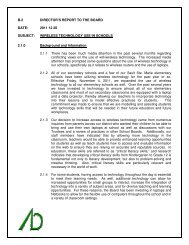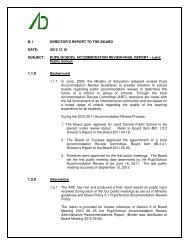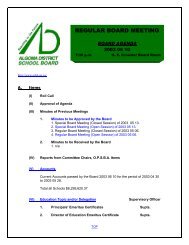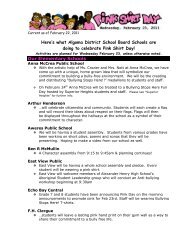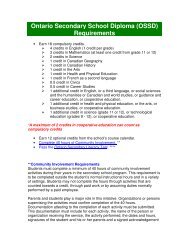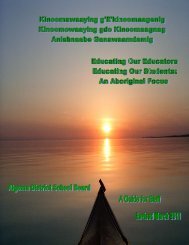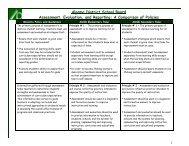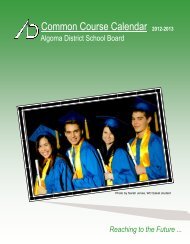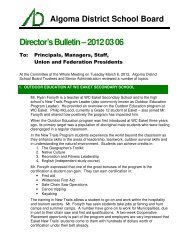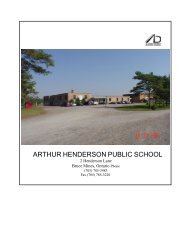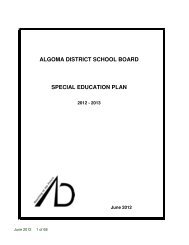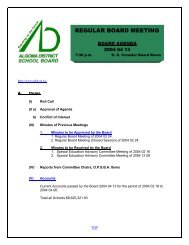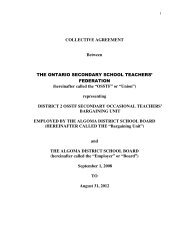Educating Our Educators (March 2011) - Algoma District School Board
Educating Our Educators (March 2011) - Algoma District School Board
Educating Our Educators (March 2011) - Algoma District School Board
- No tags were found...
Create successful ePaper yourself
Turn your PDF publications into a flip-book with our unique Google optimized e-Paper software.
Many of the adoptees, who are now adults, are seeking to reunite with birth families andcommunities. A substantial portion of these adoptees face cultural and identity confusionissues as the result of having been socialized and acculturated into a euro-Canadianmiddle-class society. For transracial adoptees, identity issues may be worsened by otherproblems arising during the search and reunion experience. As one author put it, theidentity issues of adoptees may be compounded by being reacquainted with one of themost marginalized and oppressed group in North American society.There are lots of adult adoptees searching for families, and families searching foradoptees. As a result, several First Nation/aboriginal reunification programs havesprouted up in Canada. These links are available below, and some have toll-freenumbers. For adoptees who are not sure where their roots are, calling any of theagencies can be a first step. They will direct you to an agency or band or provincial postadoptionoffice that can help. Although Saskatchewan currently does not have a Nativerepatriation program, Saskatchewan Social Services has a part-time Repat worker whocan assist at Post Adoption Registry, 1920 Broad Street, Regina, SK S4P 3V6,(306)787-3654 or 1-800-667-7539.For many adoptees and birth families, it has been beneficial to utilize the services ofexperienced Repatriation workers. These individuals can assist all parties in theemotional and psychological preparation for reunion.By Dr. Raven Sinclairravsin@sasktel.net(See bibliography list below)1. Kimelman, 1985; Sinclair et al., 19912. Kimelman, 1985: see also the UN Convention on Genocide at this site.3. RCAP, 1996 (Search under “Adoption”)4. This knowledge is based on personal experience and knowledge as anadoptee with adoptive siblings, and as an adoption worker.5. Bagley, Young & Scully, 19936. Hall, 1995; Gilchrist, 1995; Richard, 1998A short reference list of Scoop material:Bagley, C., Young, L., & Scully, A. (1993). International and transracial adoptions: Amental health perspective. Northern Social Work Practice, Northern and RegionalStudies Series, Volume 4.116-135.Fanshel, D. (1972). Far from the reservation: the transracial adoption of American Indianchildren. New Jersey: The Scarecrow Press. 116-135.Fournier, S. & Crey, E. (1997). Stolen from our embrace: The abduction of First Nationschildren and the restoration of Aboriginal communities. Vancouver: Douglas & McIntyre.<strong>Educating</strong> <strong>Our</strong> <strong>Educators</strong> – <strong>Educating</strong> <strong>Our</strong> Aboriginal Students for Success 98



